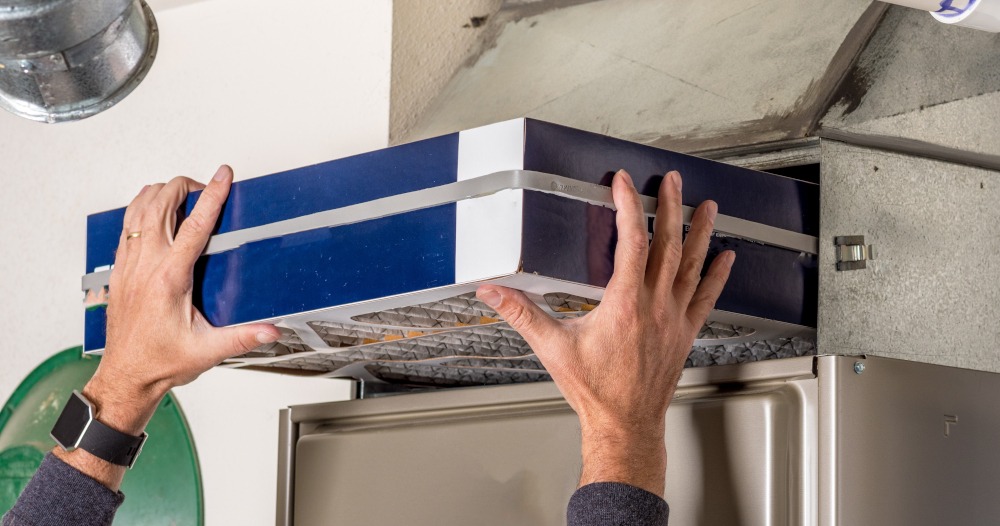

Author:
Revised:
March 2nd, 2021
Humidity and allergies and mold, oh my!
If you’ve loaded down your house with Himalayan salt lamps, tissue boxes, and box fans, but you haven’t had luck fighting off humidity, allergies, and mold, don’t worry – you still have options.
Other indoor air quality guides available on the internet focus on opening windows and doors to let fresh air in. While you should definitely try to get fresh air, this isn’t always seasonally possible. But when the air inside your home can be more polluted than the air outside, what can you do?
Even when it’s bleak outside (as it often can be in Central Ohio), you can still improve air circulation within your home. And the good news: you may already have what you need.
Your HVAC system affects more than just the temperature of your home. We can also use your HVAC system to address issues with indoor air quality.
At Fire & Ice, we work with thousands in the Columbus, Ohio area each year to improve their homes’ air quality. These solutions may involve adjusting part of their existing HVAC system or installing additional equipment.
At the end of the day, though, it’s up to you to decide which options are best for you. My job is just to help you learn about all of your options.
In this article, we explore a range of ways you can improve air quality within your home. For some of these, you won’t need any additional materials or tools. Others can help address specific needs and air quality concerns more in-depth.
How to Improve Indoor Air Quality in Your Home
Ways you can improve indoor air quality (IAQ) in your home using your HVAC system include:
- Increase air circulation
- Check your HVAC filters
- Schedule regular maintenance for your HVAC system
- Invest in HVAC indoor air quality products
In the coming sections, we’ll discuss each of these solutions. We’ll start with the easiest, quickest fixes and work up to options that can address more serious IAQ issues.
1. Increase Air Circulation
Increasing air circulation inside your home can address several indoor air quality (IAQ) issues, including:
- Dusty or polluted air
- Stuffy, humid air
- Uneven temperatures
Most newer thermostats either have a switch labeled “auto” and “on” or a button with a fan icon that allows you to toggle between settings. Either way, this controls your blower motor and fan.
Your blower motor is responsible for circulating conditioned air throughout your home year-round. When you set your fan to run on “auto,” your blower can only circulate air when your air conditioner, heat pump, furnace, or air handler is running.
However, if you set your fan to “on,” your blower can run even when your HVAC system isn’t heating or cooling your home. This means that the air in your home can circulate more frequently. This can help even out temperatures throughout your home (even in muggy upstairs rooms).
Increased air circulation also means that your HVAC filtration system filters the air in your home more frequently, which can be great for those who suffer from allergies and asthma.
While we generally recommend constantly running your blower, this may not always be comfortable. When your system isn’t running, your blower can only circulate room-temperature air. This can make you feel a little chilly when it comes out of your vents.
But still, if constant air circulation isn’t comfortable for you, we recommend letting your blower run as much as you can to address some of these issues.
2. Check Your HVAC Filters
Your HVAC system’s filter can negatively affect indoor air quality in two ways if not handled properly:
- By reducing airflow
- By neglecting to catch harmful particulates
Your HVAC filter’s job is to remove dust, debris, and allergens from the air circulating throughout your home.
As your filter collects particulates, it’s normal for your filter to get dirty. This is why it’s important to regularly change your filter.
Depending on the type of filter your system uses, you may need to change your filter every month or only once a month. Your filter’s packaging can likely offer insight. But you may need to change your filter more regularly than the packaging recommends at times.
It’s important to remember that these recommendations are based on lab results. The conditions inside your home will likely vary.
If you notice weak airflow coming from your vents, it may be time to change your filter.
It’s important to listen to your HVAC system. The longer a filter stays in your system, the dirtier it will become. If you go too long between changing your filter, it can become clogged. And clogged filters can seriously damage your system.
Changing your filters can also improve air circulation throughout your home.

But increased air circulation can be a bad thing if your filter isn’t prepared to remove harmful particulates from the air.
While almost all filters can remove larger debris from the air, some fail at catching smaller particles like pet dander and pollen. This can especially be difficult for those with allergies.
But this isn’t something that you have to adapt to – there are a number of different types of filters available today.
One-inch filters have been the standard since the 1950s. But many one-inch filters only catch larger particulates.
At Fire & Ice, we include four-inch media filters with each furnace we install. Some four-inch filters are capable of catching particles as small as 0.3 microns.
Examples of particles that a four-inch filter can catch:
- Bacteria
- Pet dander
- Pollen
- Mold spores
- Soot
If your family struggles with allergies or asthma, switching to a different type of filter could help.
Switching to a different filter can also help if you have issues with lingering pet or cooking odors.
To determine which type of filter fits your needs best, check out this article that breaks down the filters on the market and the effects they can have on your home.
3. Schedule Regular Maintenance for Your HVAC System
Although maintenance primarily ensures that your system is operating safely, scheduling regular maintenance for your HVAC system can also help improve indoor air quality.
When an HVAC technician services your system, they don’t just check for issues with your system. An HVAC maintenance appointment – whether it’s a tune-up for your furnace, air conditioner, heat pump, or air handler – also includes cleaning.
During a furnace tune-up, an HVAC technician should clean dust or debris from your furnace cabinet. The technician should also examine your blower fan.
While many new furnaces typically don’t require intensive cleaning, this can vary depending on factors in your home. Debris like pet hair and lint that ends up in your system can collect on your blower fan. Because the blower fan controls air circulation year-round, this can affect your heating and cooling systems’ performance.
During an air conditioner or heat pump tune-up, an HVAC technician should check the condition of your condenser, compressor, and evaporator coil.
When air conditioners and heat pumps cool your home, they also remove moisture from the air inside your home. While both systems have condensate drains, it’s important to monitor air conditioners and heat pumps for mold and bacteria buildup.
If you notice abnormal smells when your system runs, this could mean that your system is circulating air pollutants like mold spores and bacteria. If this is the case, speak with your HVAC partner immediately to schedule a cleaning.
4. Invest in HVAC Indoor Air Quality Products
Sometimes your existing HVAC system needs a little help to address indoor air quality issues. If your health and comfort are at risk, your HVAC partner can add IAQ products to your existing system.
HVAC indoor air quality products include:
- Humidifiers
- Dehumidifiers
- Air purifiers
Humidifiers
Humidifiers are practically essential for living in climates like Central Ohio. Cold winters bring dry air.
Dry air can create several issues for you and your home:
- Dry, itchy skin
- Bloody noses
- Static electricity
- Gapped or cracked hardwood floors
- Damaged woodwork, furniture and/or wooden musical instruments
Dry air can also make your furnace or heat pump work harder to heat your home.
Because they add water vapor to the air inside your home, humidifiers help prevent the negative effects of dry air.
Humidifiers also give your furnace a break. Since water vapor helps air hold heat better, your furnace won’t need to run as often to maintain the temperatures in your home.
To determine whether a humidifier would be a good addition to your home, check out the video below or this article that breaks down the benefits, the different types of humidifiers, and the costs.
Dehumidifiers
Too much humidity can also affect your comfort and your home. Dehumidifiers help by removing humidity from the air.
In coastal regions, dehumidifiers can be essential to not only keep cool but also protect your home and possessions.
But regardless of where you live, a dehumidifier can help if you deal with any of the following:
- Warped wood floors or woodwork
- Damaged furniture or wooden musical instruments
- Insects like spiders and silverfish
- Dust mites
- Muggy upper floors
- Damp basement
Although your air conditioner or heat pump does dehumidify your home, adding a dehumidifier can give it a break. Because a dehumidifier’s only job is to remove humidity from the air, your air conditioner or heat pump will be able to focus on cooling your home.
Removing humidity from the air can also help you feel cooler. With less water vapor, the air won’t be able to hold heat as easily. And because warm air and humidity tend to rise, a dehumidifier can help you reclaim upstairs rooms that are typically too muggy and hot.
Dehumidifiers can also help drive creepy crawlies from your home. Insects and arachnids like spiders, centipedes, and silverfish thrive in spaces with more than 70% humidity.
Cutting the humidity in your home to the 30% - 60% range can discourage insects, mold, and bacteria from settling into your home.
To figure out if a dehumidifier is right for you, check out the video below or this article that breaks down the benefits and costs of dehumidifiers.
Air Purifiers
Does it seem like when one member of your household gets sick, your whole family does? There’s HVAC equipment for that!
Air purifiers can kill viruses and bacteria before they can spread. One air purifier, the Reme Halo, can kill germs from a sneeze within three feet of the person who sneezed (gesundheit). The Reme Halo is also 99.9% effective against COVID-19.
With its ability to eliminate germs before they can spread, an air purifier can be a great investment if you or a member of your family is immunocompromised.
If you think an air purifier could help protect you and your family, check out the video below or this article that further breaks down the benefits and costs.
Keeping Your Home Safe and Comfortable
If your home’s air quality isn’t up to par, speak with your HVAC partner. A good HVAC contractor should be able to recommend and install equipment that can improve your safety and comfort at home.
If you live in Central Ohio, we’d love to speak with you about the best way to improve your indoor air quality!
At Fire & Ice, we offer a variety of options to customize your HVAC system to your needs.
To get in touch with a Fire & Ice representative or schedule a free in-home estimate, click below. We look forward to speaking with you!



